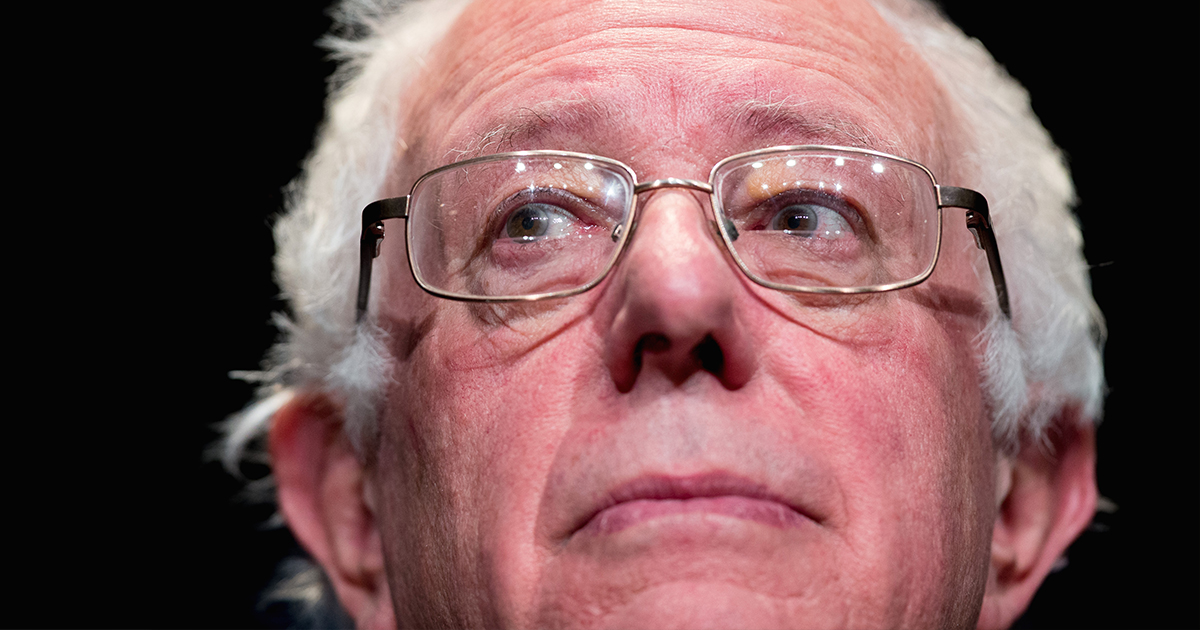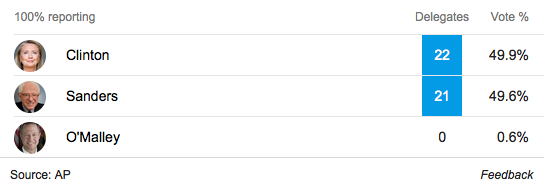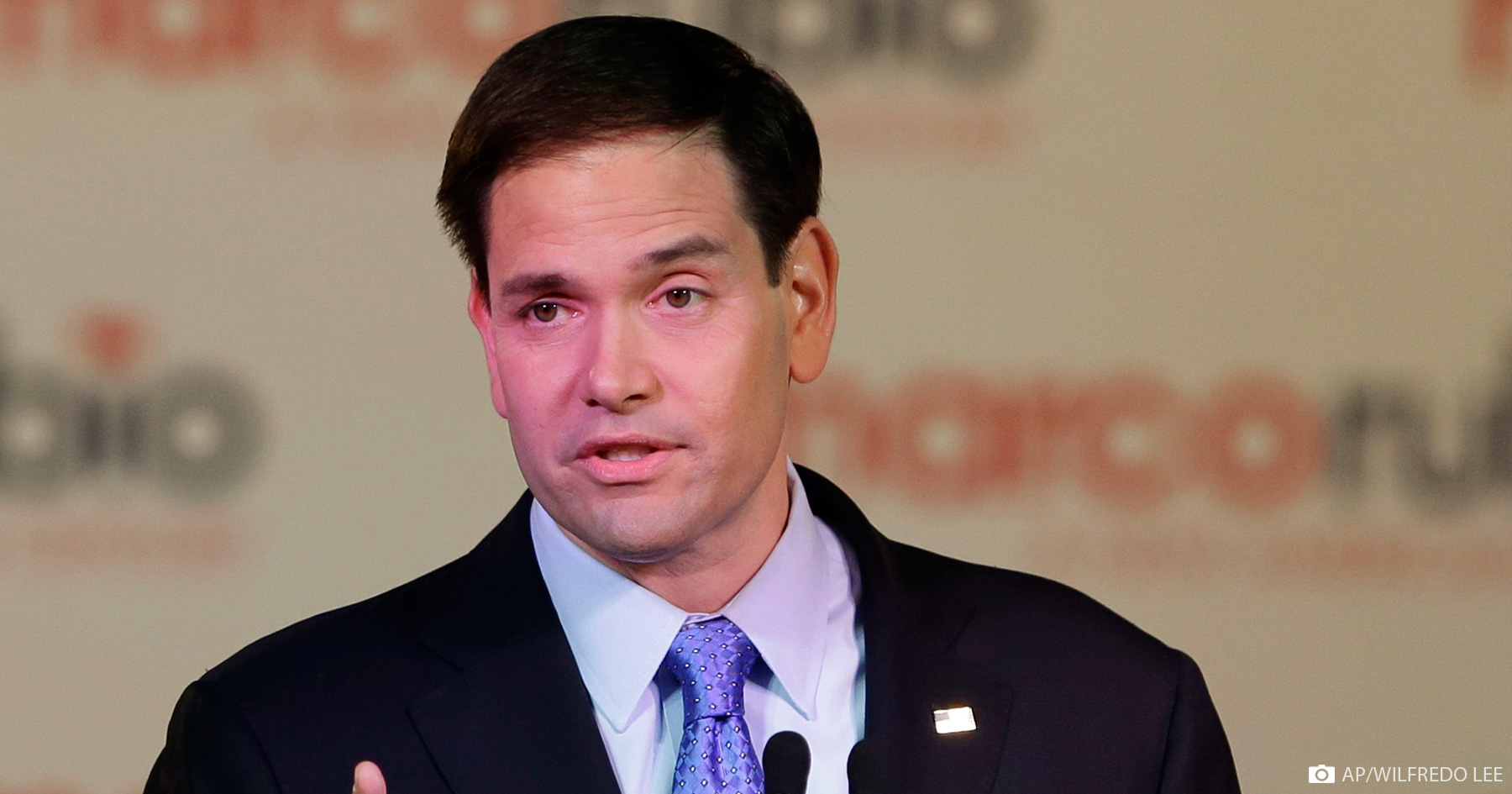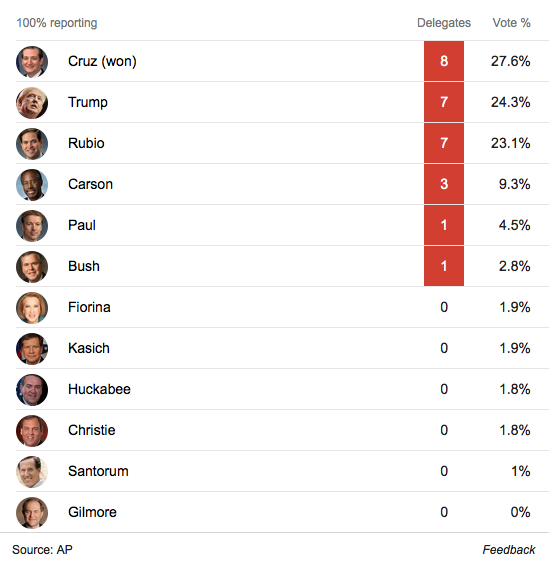The 3 Most Important Things to Know From the Iowa Caucus

By:
The first voting in the 2016 presidential election took place Monday night at the Iowa Caucus.
Here are the highlights:
1. Bernie needed a lot more out of Iowa, and he now has a much tougher path to victory.
 AP/Andrew Harnik - apimages.com
AP/Andrew Harnik - apimages.com
Sorry, Bernie fans, but your candidate needed to do much better in Iowa. Sanders fought Clinton to a draw, but to stay "on track" to win the nomination, Sanders should have won twice as many delegates as Hillary Clinton, according to David Wasserman at FiveThirtyEight. Instead, Clinton actually took home one more delegate than Sanders.
 Google
Google
Despite this reality, the media narrative after Iowa is very pro-Sanders. It is true that Sanders' finish is quite the accomplishment when you consider he was down 30 points in Iowa in early November. And yes, it's also remarkable that a candidate who is cool with the "Democratic Socialist" label just grabbed almost 50 percent of the vote in the Iowa Caucus.
But if we're talking about actually winning the nomination, Sanders needed more out of Iowa. The state's Democratic voters are perfectly aligned to Sanders' strengths:
- Iowa Democrats are more liberal than other primary states.
- Iowa Democrats are more white than other primary states.
- Iowa Democrats are less affluent than other primary states.
- Even in a small state, Iowa is stocked with a number of college campuses full of young voters.
That was the magic formula that allowed Barack Obama to build a grass roots win over Hillary Clinton in Iowa in 2008. Sanders, however, was not able to replicate Obama's path to victory.
After the next state, New Hampshire, which is also tailored to Sanders, the rest of the nomination fight is not nearly as hospitable. As Wasserman explained before the Iowa Caucus, "98 percent of pledged Democratic delegates will come from states with lower shares of liberal whites than Iowa and New Hampshire" while "just 13 percent of pledged Democratic delegates will be awarded in caucus states like Iowa, which as 2008 proved, tend to bring out more liberal participants than primaries."
The result? "If Sanders prevails narrowly in Iowa or New Hampshire, his support among liberal whites and in college towns - essentially Portlandia - would be entirely consistent with a scenario in which he also gets clobbered by Clinton nationally," Wasserman concluded.
Monday night, not only did Sanders not prevail by a wide margin, he finished in a virtual tie.
2. Marco Rubio is in great shape now.
 AP/Wilfredo Lee - apimages.com
AP/Wilfredo Lee - apimages.com
For months, Sen. Marco Rubio has had an important goal: Convince the big money people in the Republican party, particularly the more moderate, Wall Street class of Republicans, that he's their best chance to beat a right-wing candidate like Sen. Ted Cruz or a totally off-the-wall candidate like Donald Trump.
He went a long way toward accomplishing that goal Monday night.
 Google
Google
By finishing third and nearly tying Trump for second, Rubio showed that contrary to reports saying his campaign was in trouble and that his team had the wrong strategy, Rubio is actually positioned quite well.
As he heads to New Hampshire, his task is to be the best "establishment" candidate in the field. New Hampshire has always been a state more friendly to establishment, conventional Republicans. That's why Gov. John Kasich and Gov. Chris Christie are staking their campaigns to strong performances in New Hampshire. But if Rubio can finish ahead of those two as well as Jeb Bush, he could be in a great position to become the establishment favorite in this race.
3. The Iowa Caucus is a joke.
 Wikimedia - wikimedia.org
Wikimedia - wikimedia.org
Iowa, you need a new system. There are just too many problems with your caucus, which has really become the Golden Globes of the presidential election process.
Monday night, there were six caucuses determined by coin flips. Yes, coin flips. That was on top of a night filled with incorrectly reported vote totals that had to be walked back later.
And it wasn't just this year. In 2012, the Republicans realized a few weeks after the caucus that they had the wrong winner. On election night, Mitt Romney was declared the victor, but that result was not certified because the votes of eight precincts were missing. When they did eventually certify a winner, they discovered that it was Rick Santorum, not Romney, who won. By 34 votes.
Aside from logistics, it's also just not a very democratic system. There's no secret ballot — caucus goers must publicly declare their vote. Candidates are allowed to show up inside the caucus and campaign. And, by the way, barely anyone bothers to show up to these events. Just 185,000 people voted on the Republican side, but that was a record turnout.
Going deeper down the rabbit hole, by winning a state where he only needed 52,000 votes, Sen. Ted Cruz has "momentum" toward winning a presidential election in a country of more than 300 million people. And the Democrats in Iowa don't even bother to tell us the actual vote totals — we just get percentages.
Enough with Iowa. Let's move on to New Hampshire.
